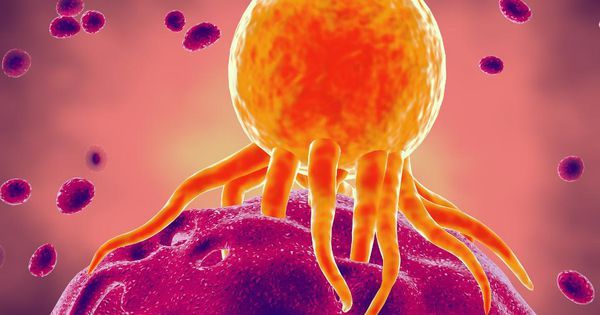A small cotton shoot is growing onboard Chang’e 4 lunar lander, scientists confirm.



Astronomers using the ALMA telescope have discovered an oddly tilted planet-forming disk within a double binary star system, a configuration that up until this point only existed in theory.
Quadruple star systems featuring two binary pairs are nothing unusual, nor is the discovery of a surrounding protoplanetary disk—a ring of gas and dust that gradually congeals to form planets. A star system located 146 light-years from Earth, called HD 98800, has all these things, but as new research published today in Nature Astronomy reveals, this system features an exceptionally strange protoplanetary disk.

In the study, researchers focused on a mechanism that routinely serves the cell by marking human virus-like genes in order to avoid identifying them as viruses. Together with the Harvard team, Levanon has discovered that “when inhibiting this mechanism, the immune system can be harnessed to fight cancer cells in a particularly efficient manner, and most effectively in lung cancer and melanoma.”
“We found that if the mechanism is blocked, the immune system is much more sensitive,” Levanon said. “When the mechanism is deactivated, the immune system becomes much more aggressive against the tumor cells.”
According to researchers, most patients with cancer either do not respond to immune checkpoint blockade (a type of drug that blocks certain proteins made by some types of immune system cells, such as T cells, and some cancer cells) or develop resistance to it. The National Cancer Institute (NCI) says these proteins help keep immune responses in check and can keep T cells from killing cancer cells. “When these proteins are blocked, the ‘brakes’ on the immune system are released and T cells are able to kill cancer cells better,” says the NCI. Some immune checkpoint inhibitors are used to treat cancer as immunotherapy uses the body’s immune system to fight cancer.

The dark waters of a lake deep beneath the West Antarctic ice sheet and a few hundred miles from the South Pole are teeming with bacterial life, say scientists — despite it being one of the most extreme environments on Earth.
The discovery has implications for the search for life on other planets — in particular on the planet Mars, where signs of a buried lake of liquid saltwater were seen in data reported last year by the European Space Agency’s orbiting Mars Express spacecraft.
Expedition leader John Priscu, a professor of polar ecology at the University of Montana, told Live Science in a telephone interview from Antarctica this week that early studies of water samples taken from Lake Mercer — which is buried beneath a glacier — showed that they contained approximately 10,000 bacterial cells per milliliter.




The past of our ancestors lives on through us: Groundbreaking research illustrates how parental experience is not only epigenetically imprinted onto offspring, but onto an unprecedented number of future generations. Rather than occurring over the elongated time scale of millions of years, genetic change can transpire in real biological time through nanoparticles known as exosomes…
Until recently, it was believed that our genes dictate our destiny. That we are slated for the diseases that will ultimately beset us based upon the pre-wired indecipherable code written in stone in our genetic material. The burgeoning field of epigenetics, however, is overturning these tenets, and ushering in a school of thought where nurture, not nature, is seen to be the predominant influence when it comes to genetic expression and our freedom from or affliction by chronic disease.
Epigenetics: the demise of biological determinism.
Wouldn’t it be great to power your home without having enormous costs to starting a journey on the alternative road? Now, you can achieve that and also take care of your figure! The founder of the Free Electric hybrid bike, Manoj Bhargava, says that his invention uses mechanical energy in the most basic way in order to transform an hour of exercise into supplying rural household with energy for 24 hours. The mechanism is simple: when you pedals, a flywheel is put in action, which turns the generator and thus charging a battery. What better motivation to work out from now on than to power your own home without any costs whatsoever? Watch the video featured to see the bike in action.

Join me for a quick review of the spikes & dips in the Bitcoin exchange rate. This time, it’s all about one very simple chart…
The chart below shows a history of BTC price spikes, dips and recovery. Click to enlarge, then start at the top—and move down.